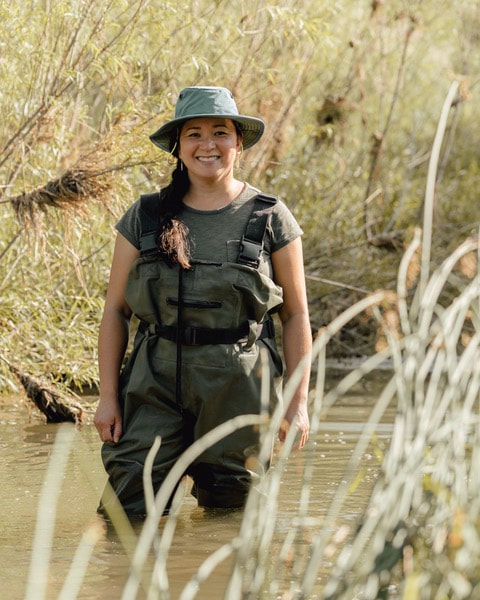As a small stream I work at the ‘eco’ side of things, and how the presence, absence and/or intensity of water drives ecosystem functions and biodiversity from molecules up through the food web. I think a lot about how water connects physical and biological processes as well as social dimensions, and how humans influence ecohydrological processes particularly among small and intermittent waterways that are scattered across the landscape.
Also, hydro (water) is at the centre of my work. In many cultures, there is a saying “Water is life” which encompasses my lab’s effort to take a more holistic approach to science. We are all passionate about using science to connect land, water and people, and to advance work that ensures freshwater sustainability for the benefit of future generations.
What are your undergraduate and graduate degrees in?
I have an undergraduate degree in Environmental Science from the University of Toronto (Canada) which introduced me to water through a geology and hydrology lens. Later in my undergraduate degree, I took my first field course in marine ecology and realized that I loved looking at the relationship of ecosystem components in aquatic environments. This led me to pursue a Masters degree in Geography from Simon Fraser University in British Columbia (Canada) where my research took me to the dynamic Mackenzie River basin in the western Canadian arctic. I deepened my understanding into how dynamic hydrological systems – from floodplain lakes and rivers to intermittent streams and rivers – were excellent model systems for research on the impacts of climate change. I also realized just how little we actually know about intermittent/temporary streams and rivers in Canada. This led me to a PhD in Ecology at the University of Toronto & Collaborative Certificate in Environmental Studies. For my PhD, I instrumented headwater streams – one intermittent stream and one perennial (permanently-flowing) stream – to explore nutrient and microbial dynamics in the hyporheic zone. The hyporheic zone is the interface between surface and groundwaters, and critical habitat for stream benthic macroinvertebrate and microbial communities. The more I pursued research on this system and at the interface of hydrology and ecological processes, I engaged approaches from different disciplines – from microbiology to chemistry, environmental studies to geography – and also became increasingly aware of the importance of small waterways and the lack of legislative tools to ensure their protection.
How did you arrive at working in/thinking about ecohydrology?
I’ve always been called to water conservation and using science to help solve environmental challenges from climate change to food sustainability and species-at-risk. I have long been curious about hydrological processes at varying ecosystem scales, and have enjoyed interrogating these dynamics at a range of spatial and temporal scales. Whether it be arctic river systems, or agriculturally-impacted systems or urbanized ones, I have been drawn to understanding drivers of ecosystem variability and the relationship between hydrological processes, ecosystem functions and biodiversity. It is impossible to restore, conserve or protect water resources without understanding the multifaceted role of water.
What do you see as an important emerging area of ecohydrology?
I think that ecohydrology will be increasingly important in exploring the fundamental dynamics of ecosystem processes at the land water interface, in human-impacted landscapes (agricultural, urbanized) and the social dimensions of restoration, food and freshwater sustainability. Ecohydrology is thankfully inherently interdisciplinary so I am excited to contribute to and further connections across disciplines including social and cultural dimensions.
This is one example review: Palmer, M., and A. Ruhi. 2019. Linkages between flow regime, biota, and ecosystem processes: Implications for river restoration. Science 365:eaaw2087.
Do you have a favorite ecohydrology paper? Describe/explain.
It’s hard to pick just one! My PhD supervisor was Dudley Williams, who studied under Noel Hynes and together they pioneered research on the hyporheic zone, connecting ecology and hydrology through explorations of macroinvertebrate communities across this critical transition. I frequently revisit and cite foundational papers in my teaching and research seminars from Tansley’s 1935 essay in Ecology where ecosystem was first defined, and in its’ definition connectivity across scales was acknowledged. One can argue that ecohydrology is well-suited to advance and explore ecological processes across scales.
Tansley, A. G. 1935. The Use and Abuse of Vegetational Concepts and Terms. Ecology 16:284–307.
For a short read and answers to a common question, I share this paper to help explain how important temporary waters are, and the need for better protection globally. Science has an important role in advancing these efforts.
Acuña, V., T. Datry, J. Marshall, D. Barceló, C. N. Dahm, A. Ginebreda, G. McGregor, S. Sabater, K. Tockner, and M. A. Palmer. 2014. Why Should We Care About Temporary Waterways? Science 343:1080–1081.
What do you do for fun (apart from ecohydrology)?
Lots! I do a lot of things for fun from traveling, outdoor adventures and exploring nature with my family, to many different forms of art (music, photography, handicrafts, watercolour) and love trying new recipes especially if it involves produce harvested from local farms or our garden plots. I do love a good round of Mahjong (a tile based game from China and played in many Asian cultures) even though I’m not very good at it, I really enjoy the challenge.

 RSS Feed
RSS Feed